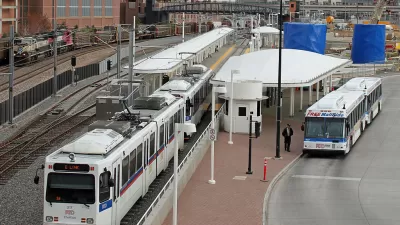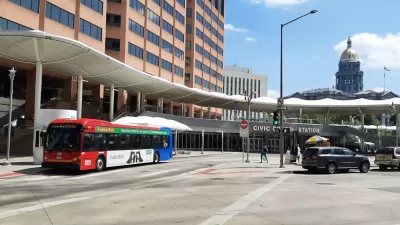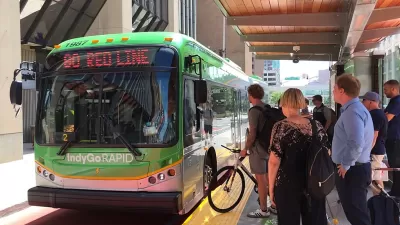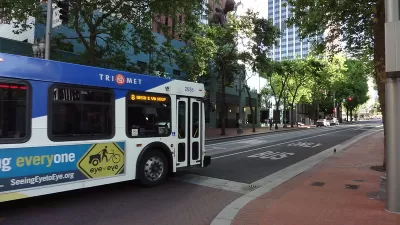The Regional Transportation District will focus on providing improved service on its most popular lines while eliminating underused routes and replacing them with on-demand microtransit.

Like other transit systems around the country, Colorado's Regional Transportation District (RTD) is proposing an overhaul of its service to better serve post-pandemic travel patterns. Nathaniel Minor reports that with ridership dropping off in suburban areas, the agency will focus on boosting service in the denser areas where ridership remained steady.
The RTD's proposal, which would change around 30 percent of the bus system, would be implemented over the next five years. The agency plans to shift existing lines, adjust service frequency on highly-used routes, and eliminate underperforming lines. To make up for the loss of service, RTD plans to introduce an on-demand service to ensure residents of lower-density areas still have access to transit. Changes would apply primarily to bus lines, while RTD's light rail and commuter rail lines would largely remain the same.
Shontel Lewis, an RTD board member, praised the proposal for "prioritizing equity" and enhancing service for the low-income communities that depend on transit. Others worry that limiting transit in suburban areas will further encourage driving and reduce the likelihood of people switching modes.
FULL STORY: RTD proposes massive overhaul: Fewer suburban buses, more service where riders remained during the pandemic

Planetizen Federal Action Tracker
A weekly monitor of how Trump’s orders and actions are impacting planners and planning in America.

Restaurant Patios Were a Pandemic Win — Why Were They so Hard to Keep?
Social distancing requirements and changes in travel patterns prompted cities to pilot new uses for street and sidewalk space. Then it got complicated.

Maui's Vacation Rental Debate Turns Ugly
Verbal attacks, misinformation campaigns and fistfights plague a high-stakes debate to convert thousands of vacation rentals into long-term housing.

Boulder Eliminates Parking Minimums Citywide
Officials estimate the cost of building a single underground parking space at up to $100,000.

Orange County, Florida Adopts Largest US “Sprawl Repair” Code
The ‘Orange Code’ seeks to rectify decades of sprawl-inducing, car-oriented development.

Maui's Vacation Rental Debate Turns Ugly
Verbal attacks, misinformation campaigns and fistfights plague a high-stakes debate to convert thousands of vacation rentals into long-term housing.
Urban Design for Planners 1: Software Tools
This six-course series explores essential urban design concepts using open source software and equips planners with the tools they need to participate fully in the urban design process.
Planning for Universal Design
Learn the tools for implementing Universal Design in planning regulations.
Heyer Gruel & Associates PA
JM Goldson LLC
Custer County Colorado
City of Camden Redevelopment Agency
City of Astoria
Transportation Research & Education Center (TREC) at Portland State University
Camden Redevelopment Agency
City of Claremont
Municipality of Princeton (NJ)





























